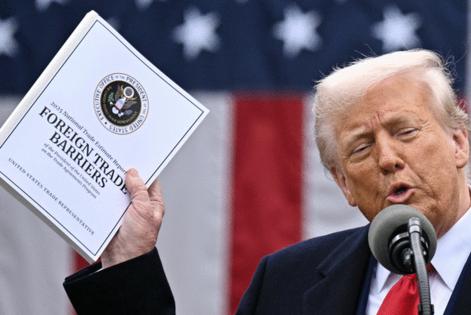Trump vows export curbs, tariffs in digital tax reprisal
Published in News & Features
U.S. President Donald Trump threatened to impose fresh tariffs and export restrictions on advanced technology and semiconductors in retaliation against other nations’ digital services taxes that hit American technology companies.
Trump posted on social media Monday that the measures “are all designed to harm, or discriminate against, American Technology” and “outrageously, give a complete pass to China’s largest Tech Companies.”
“This must end, and end NOW!” Trump posted. “Unless these discriminatory actions are removed, I, as President of the United States, will impose substantial additional Tariffs on that Country’s Exports to the U.S.A., and institute Export restrictions on our Highly Protected Technology and Chips.”
The president’s latest act of trade brinkmanship again raises uncertainty over tariff rates for U.S. trading partners. Soon after Trump set country-based levies with dozens of partners earlier this month, he vowed to impose new charges on a range of imports. Last week, he said imported furniture would be subject to new duties.
Trump has long argued that digital services taxes discriminate against U.S. tech giants such asTrum Amazon.com Inc., Google owner Alphabet Inc. and Facebook parent Meta Platforms Inc. The U.S. has increasingly used export restrictions on technologies — including advanced chips from firms including Nvidia Corp. for artificial intelligence — it deems critical for national or economic security.
The warning from the president comes a week after the U.S. and the European Union agreed in a joint statement that they would together “address unjustified trade barriers,” and would “not impose customs duties on electronic transmissions.” The 27-member bloc also confirmed it wouldn’t adopt network usage fees.
Yet the E.U. reiterated separately that it had not committed to alter E.U. digital regulations — potentially leaving the issue untouched as leverage for future trade talks, as the bloc pushes for tariff-free treatment of wine and spirits.
“We have made it very clear to the U.S. that changes to our digital regulations — the Digital Markets Act and the Digital Services Act — were not on the table,” the E.U. said in a fact sheet.
Earlier this summer, Canada backed down from imposing a digital tax hours before it was due to go into effect, after Trump suspended trade talks with the country over what he called an “egregious” tax.
Other countries — including the U.K. — have not rolled back their 2% levy on revenue from search engines, social media services and online marketplaces.
The push comes as the Organization for Economic Cooperation and Development — a club of 38 mostly rich countries — continues to work on an agreement that would abolish digital taxes in favor of an international pact on how to allocate the profits of multinationals for tax purposes. But that effort could also provoke opposition from the U.S., which could lose taxation rights.
©2025 Bloomberg L.P. Visit bloomberg.com. Distributed by Tribune Content Agency, LLC.







Comments